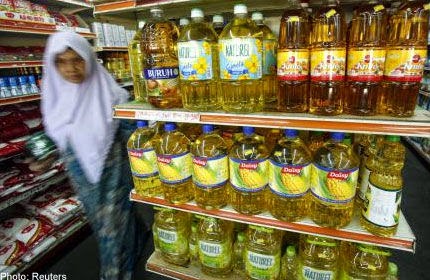KUALA LUMPUR: THE recently implemented Goods and Services Tax' (GST) will have minimal impact on the plantation sector, says analysts.
They expect planters like Felda Global Ventures Holdings Bhd, IOI Corp Bhd, Sime Darby Bhd, Sarawak Oil Palms Bhd, Kuala Lumpur Kepong Bhd, Genting Plantations Bhd, IJM Plantations Bhd and Hap Seng Plantations Holdings Bhd to be ready for the new tax structure.
On April 1, the 10 per cent Sales Tax and 6 per cent Service Tax was replaced with the 6 per cent GST.
"It is a complete pass-through for oil palm planters. Planters who are GST-registered with the Customs Department will be able to claim for every value-adding activity along the supply chain until the millers' gate," said an analyst.
When refiners buy crude palm oil from millers, they pay upfront. After processing the oil into cooking oil, oleochemicals and biodiesel, refiners export these value-added products from the seaport.
Since refiners are at the tail-end of 'export gate', they do not charge GST to overseas buyers when the refined oil is shipped out.
The timing difference between refiners paying the six per cent GST to the millers and claiming it back from the Customs Department is the funding period. If it takes too long, financially weaker refiners serving the export market, will face cash-flow problems.
In the domestic market, cooking oil re-packers under the Cooking Oil Price Stabilisation Scheme face the same fate, too.
These re-packers pay the six per cent GST upfront to the refiners but they are not able to pass it on to the retailers because cooking oil, sold at less than 20kg, is zero-rated.
"If cooking oil re-packers do not get their refunds on time, their margin will be squeezed and their cashflow affected.
"In the worst case scenario, re-packers may slow down and eventually stop packing the cooking oil, resulting in shortage of this kitchen staple at supermarket shelves," the analyst explained.
"In other words, it is crucial that the Customs Department process claims and refunds in a timely manner. Failure to do so will burden refiners and cooking oil repackers, thus unnecessarily raising their cost of doing business," he said.
CIMB Investment Bank analyst, Ivy Ng, is neutral about the GST impact on the plantation sector. "We see minimal negative impact on small planters who may not be GST-registered with the Customs Department."
"As for large planters who are GST-registered, there is no impact because they can pass it along the value chain and claim back input costs from the government," she said.
They expect planters like Felda Global Ventures Holdings Bhd, IOI Corp Bhd, Sime Darby Bhd, Sarawak Oil Palms Bhd, Kuala Lumpur Kepong Bhd, Genting Plantations Bhd, IJM Plantations Bhd and Hap Seng Plantations Holdings Bhd to be ready for the new tax structure.
On April 1, the 10 per cent Sales Tax and 6 per cent Service Tax was replaced with the 6 per cent GST.
"It is a complete pass-through for oil palm planters. Planters who are GST-registered with the Customs Department will be able to claim for every value-adding activity along the supply chain until the millers' gate," said an analyst.
When refiners buy crude palm oil from millers, they pay upfront. After processing the oil into cooking oil, oleochemicals and biodiesel, refiners export these value-added products from the seaport.
Since refiners are at the tail-end of 'export gate', they do not charge GST to overseas buyers when the refined oil is shipped out.
The timing difference between refiners paying the six per cent GST to the millers and claiming it back from the Customs Department is the funding period. If it takes too long, financially weaker refiners serving the export market, will face cash-flow problems.
In the domestic market, cooking oil re-packers under the Cooking Oil Price Stabilisation Scheme face the same fate, too.
These re-packers pay the six per cent GST upfront to the refiners but they are not able to pass it on to the retailers because cooking oil, sold at less than 20kg, is zero-rated.
"If cooking oil re-packers do not get their refunds on time, their margin will be squeezed and their cashflow affected.
"In the worst case scenario, re-packers may slow down and eventually stop packing the cooking oil, resulting in shortage of this kitchen staple at supermarket shelves," the analyst explained.
"In other words, it is crucial that the Customs Department process claims and refunds in a timely manner. Failure to do so will burden refiners and cooking oil repackers, thus unnecessarily raising their cost of doing business," he said.
CIMB Investment Bank analyst, Ivy Ng, is neutral about the GST impact on the plantation sector. "We see minimal negative impact on small planters who may not be GST-registered with the Customs Department."
"As for large planters who are GST-registered, there is no impact because they can pass it along the value chain and claim back input costs from the government," she said.
